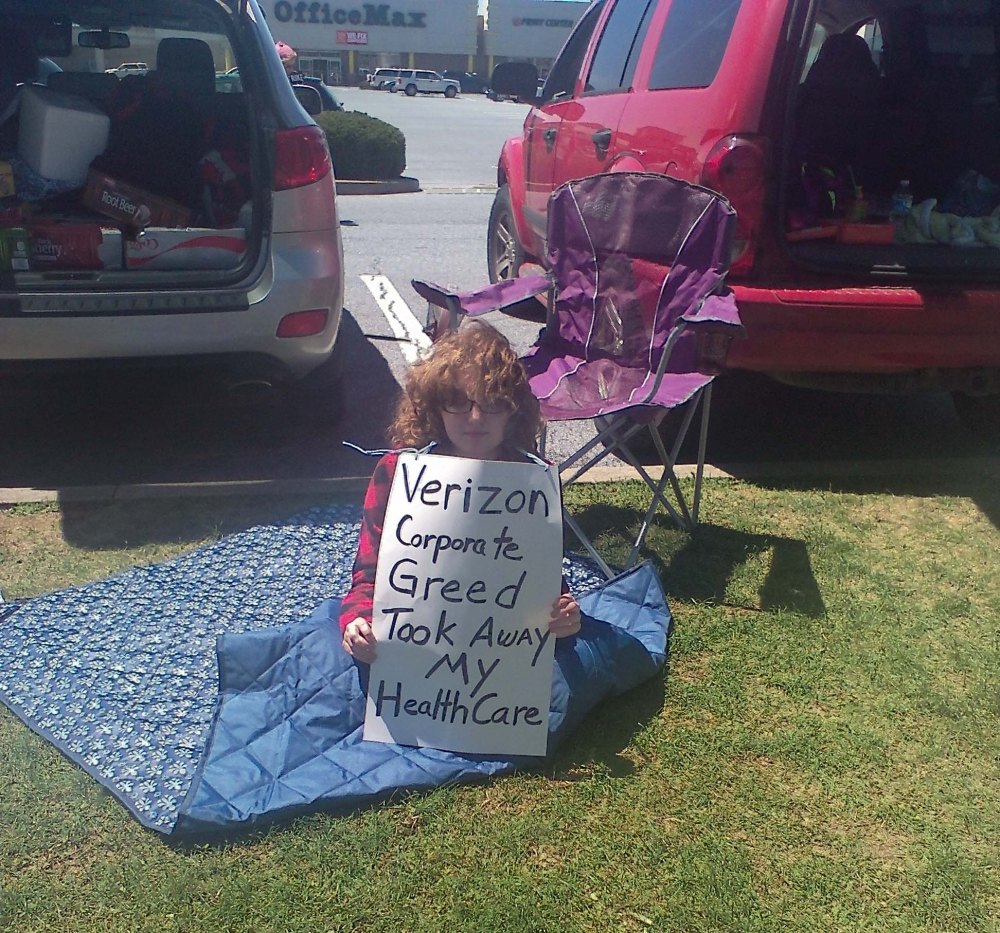
For 31 days as of May 12, nearly 40,000 Verizon workers up and down the northeast corridor from Massachusetts to Virginia have been on strike. Members of the Communications Workers of America and the International Brotherhood of Electrical Workers, the strikers have been working without a contract since last August. They are striking not for higher wages or increased benefits but to keep the company from changing 18 items put in past contracts to preserve a semblance of job security and quality of life for workers.
The issues at stake include pensions, sick days, the amount retirees pay for health insurance, offshoring jobs, and outsourcing work to low-wage contractors.
According to an article published by the Economic Policy Institute, over the past three years Verizon has created $39 billion in profits; per year, its CEO makes 200 times the amount the average worker is paid.
There are about 100 workers on strike in Lancaster County. On May 11, we encountered workers picketing outside a Verizon store in the Red Rose Commons shopping center, off Fruitville Pike. Here are some of their thoughts about their struggle for decent jobs.
Layoffs and a crushing workload for those who remain
Several of the picketers at Red Rose Commons were service technicians — the people who build and maintain the infrastructure that allows us to communicate via cell phones and the Internet. They expressed their frustration at being overworked as a result of layoffs and Verizon’s use of contract labor.
“This is a company that lays off technicians, brings in the same amount of work, and then makes us work 12-hour days,” said Rich,* a service tech who’s been with Verizon for 20 years and is the local rep for CWA.
In fact, Rich said, in 2015 the company essentially engineered a service emergency throughout much of the state by laying off dozens of techs.
It lasted six months.
Since a “service emergency,” typically the result of a natural disaster, has to be declared by the government, the technical name for the problems resulting from the layoffs was “long-term service difficulty,” Rich said.
During this “service difficulty,” the striking techs said, they were forced to work 12-hour shifts six days a week, often with longer-than-normal commutes to areas that lacked the necessary number of workers. If they took a sick day during this period, they said, they were penalized.

Quality of life
In addition to threats of decreased benefits, the nature of service tech jobs is changing. Now on the table, said a tech named Brian who has been with the company for 19 years, is the idea that under the next contract service techs will be required to work in a different location for up to two months out of the year.
“Would you want to go down to West Virginia for two months?” he asked.
“It’s a quality-of-life issue … We’re striking because we’d like to have a middle-class life. I mean, I have kids and I’d like to see them.”
Brian said he worries that the people Verizon hired during the strike are not given adequate background checks and vetted before going out to serve customers, often entering their homes. Even before the strike this was an issue because Verizon has been hiring more and more contract workers, many of whom are not from the local community, he said.
A post on CWA’s website points out another troubling consequence of Verizon’s use of temporary contract labor. “Recently, contractors in Rockland County, New York, dug into a gas line and caused a large explosion— destroying several homes, injuring four people and landing two volunteer firefighters in the hospital,” the post reads.
Service tech David, an 18-year employee, said that union membership has declined steeply in his time with the company. “The company’s been urging people to retire, laying people off when they can,” he said. “[Verizon] has been trying to get as much money out of the network as they can without putting money into it.”
The striking techs are concerned that their jobs could go away permanently, eroding the middle class in Lancaster County. They worry that if they don’t struggle for change now, their chance to retain decent jobs will slip away entirely.
“Eventually, what will we have left?” Brian said.
The threat of outsourcing
Many customer-service and administrative jobs have been moved to India and the Philippines, the strikers said. Many more are in danger of being moved.
Stephanie, an 18-year employee who works in collections as a consultant, said her job could be moved to India or the Philippines, but it’s also possible that Verizon will opt to move her job to a right-to-work state. The company has already moved many customer-service jobs to Florida and Georgia “so they don’t have to pay a living wage,” she said, explaining that in those states, Verizon uses non-union contract employees.

Support across industries
Rhonda, a 22-year assignment administrator, stressed the importance of strong resistance. “You have to embarrass them publicly — you have to put financial pressure on them publicly,” she said.
Rhonda recalled fighting for an eight-hour cap on forced overtime in 2000. Now, “they want to loosen the language” to roll back that protection, she said.
The strikers said they’ve gotten sparse media attention, but many passing drivers in the busy shopping center honk their horns in support. Steelworkers and postal employees, among others, have come out to stand in solidarity with the Verizon workers and bring them treats like hot chocolate to get them through the long hours of protest.
Rhonda sees the Verizon strike as part of a larger struggle going on in the country. “What we’re doing here is not just for us,” she said. “If we don’t lift each other up, then none of us will have a living wage.”
—Story by Julia Scheib. Reach her at julia.scheib@gmail.com.
*Last names have been omitted to protect workers from retaliation.